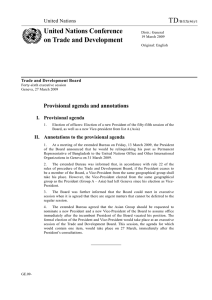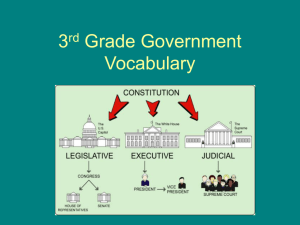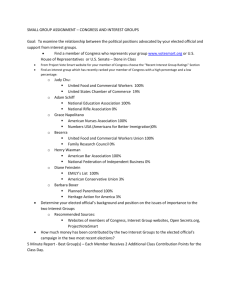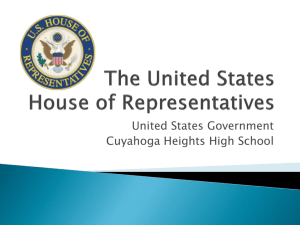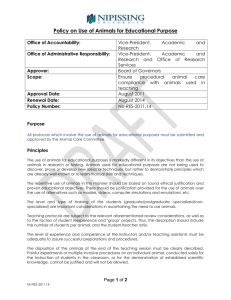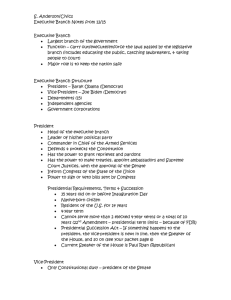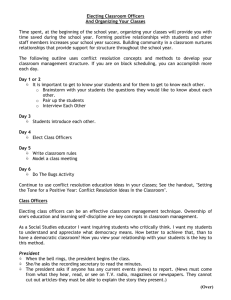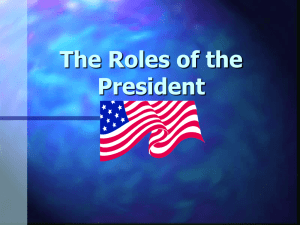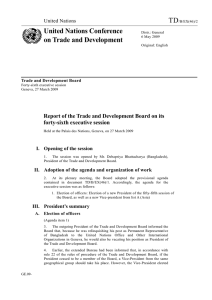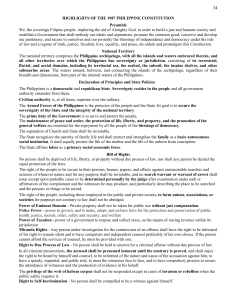SECTION 1. The executive power shall be vested in the President of
advertisement
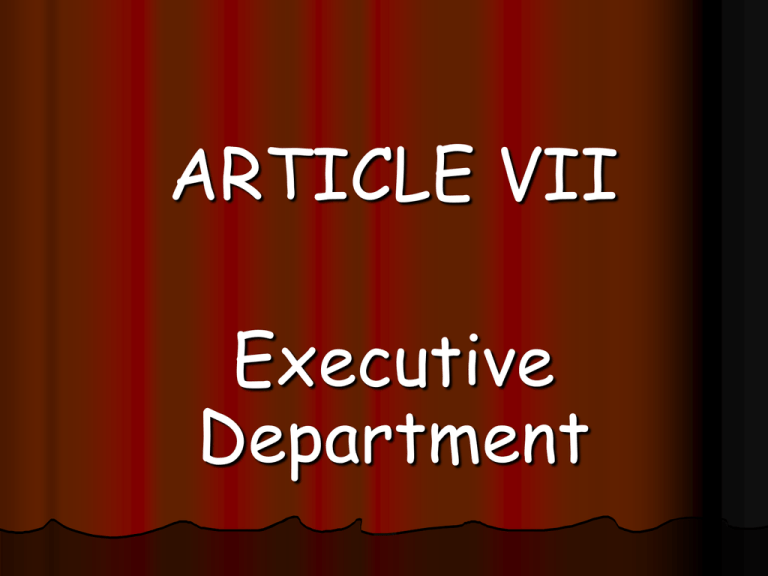
ARTICLE VII Executive Department SECTION 1. The executive power shall be vested in the President of the Philippines. EXECUTIVE POWER - power to administer laws, carry them into practical operation and enforce their due observance. SECTION 2. No person may be elected President unless he is a natural-born citizen of the Philippines, a registered voter, able to read and write, at least forty years of age on the day of the election, and a resident of the Philippines for at least ten years immediately preceding such election. SECTION 3. There shall be a Vice-President who shall have the same qualifications and term of office and be elected with and in the same manner as the President. He may be removed from office in the same manner as the President. SECTION 4. The President and the VP shall be elected… for a term of six years… The President shall not be eligible for any reelection. No person who has succeeded as President and has served as such for more than four years shall be qualified for election to the same office at any time. No Vice-President shall serve for more than two consecutive terms. The Supreme Court… shall be the sole judge of all contests relating to the election… of the President and VP… TERM of OFFICE TENURE of OFFICE - refers to the period during which an officer may claim to hold the office as a matter of right. - period during which the incumbent actually holds the office. SECTION 8. In case of death, permanent disability, removal from office, or resignation of the President, the Vice-President shall become the President to serve the unexpired term. In case of death, permanent disability, removal from office, or resignation of both the President and Vice-President, the President of the Senate or, in case of his inability, the Speaker of the House of Representatives, shall then act as President until the President or Vice-President shall have been elected and qualified. SECTION 9. Whenever there is a vacancy in the Office of the Vice-President during the term for which he was elected, the President shall nominate a VicePresident from among the Members of the Senate and the House of Representatives… SECTION 10. The Congress shall… after the vacancy in the offices of the President and VP occurs, convene…and enact a law calling for a special election to elect a President and VP. SECTION 13. The President, the VP, the Members of the Cabinet… shall not, unless otherwise provided in the Constitution, hold any other office or employment during their tenure. They shall not … practice any other profession, participate in any business or be financially interested in any contract with the Government. The spouse and relatives by consanguinity or affinity within the fourth civil degree of the President shall not during his tenure be appointed as members of Constitutional Commissions or the Office of the Ombudsman, as Secretaries or heads of bureaus or offices… Specific Powers of the President Article VII Sec. 16 - 23 Appointing Power SECTION 16. The President shall nominate and, with the consent of the Commission on Appointments, appoint the heads of the executive departments, ambassadors, other public ministers and consuls, or officers of the armed forces from the rank of colonel or naval captain, and other officers whose appointments are vested in him in this Constitution. APPOINTMENT – is the act of designation by the executive officer of the individual who is to exercise the functions of a given office. Although the Constitution contains no provision expressly vesting in the President the power to remove executive officials from their posts, he still has the removal power as it is implied from his appointing power. Control Power SECTION 17. The President shall have control of all the executive departments, bureaus and offices. He shall ensure that the laws be faithfully executed. CONTROL POWER – President may alter or modify or set aside actions of subordinate officers. He has also the power to supervise, investigate, suspend or remove erring officers. Military Power SECTION 18. The President shall be the Commander-in-Chief of all armed forces of the Philippines and whenever it becomes necessary, he may call out such armed forces to prevent or suppress lawless violence, invasion or rebellion…. he may, suspend the privilege of the writ of habeas corpus or place the Philippines or any part thereof under martial law. Restrictions on the President’s power to declare Martial Law. There must be an invasion or rebellion The duration shall not exceed 60 days The President must submit a report to Congress within 48 hours after the declaration The declaration may be revoked by Congress The Supreme Court may inquire into the sufficiency of the factual basis of the proclamation Pardoning Power SECTION 19. … the President may grant reprieves, commutations and pardons … He shall also have the power to grant amnesty with the concurrence of a majority of all the Members of the Congress. REPRIEVE – postponement of the execution of a death sentence. COMMUTATION – reduction of the sentence imposed to a lesser punishment. PARDON – exempts from the punishment the law inflicts for a crime he has committed. AMNESTY – abolishes the offense of which one is charged. Borrowing Power SECTION 20. The President may contract or guarantee foreign loans on behalf of the Republic of the Philippines with the prior concurrence of the Monetary Board, and subject to such limitations as may be provided by law. Diplomatic Power SECTION 21. No treaty or international agreement shall be valid and effective unless concurred in by at least two-thirds of all the Members of the Senate. Budgetary Power SECTION 22. The President shall submit to the Congress within thirty days from the opening of every regular session, as the basis of the general appropriations bill, a budget of expenditures and sources of financing, including receipts from existing and proposed revenue measures. Informing Power SECTION 23. The President shall address the Congress at the opening of its regular session. He may also appear before it at any other time. Section 23 gives an opportunity to the President to give information on the “state of the nation” and to recommend such measures to the legislature as he may deem necessary and proper.
